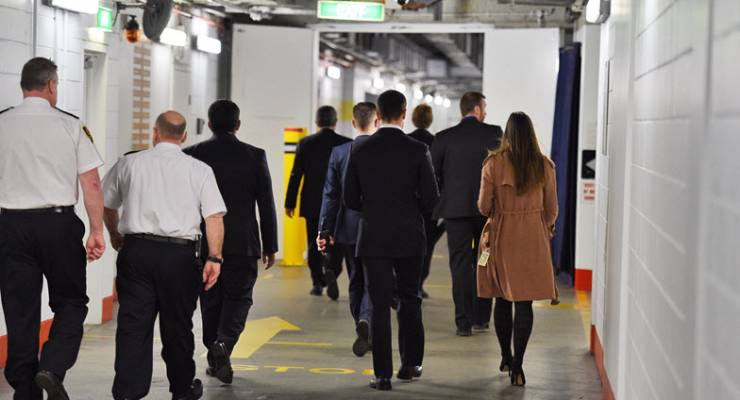
Australian Federal Police at Parliament house 2016
The Senate privileges committee has raised concerns that NBN Co may have used evidence obtained during raids on an ALP staffer’s home to sack two whistleblowers, but has stopped just short of finding the company in contempt of the Senate.
The evidence obtained during raids on ALP headquarters and the home of a former ALP staffer in Melbourne, during the 2016 election, on alleged leaks from NBN Co will not be able to be used as part of an investigation into the leaks after a Senate privileges committee recommended the evidence be considered privileged.
But the Senate privileges committee questioned the actions of the government-owned broadband company during the raid on former ALP staff member Andy Byrne. An NBN Co staffer during the raid was seen taking photos of documents on his phone and sending them back to NBN Co. Former ALP senator Stephen Conroy had claimed privilege over the documents before the raid, meaning the AFP would need to wait before being able to use them as part of the investigation into the leaks, but the committee questioned whether the actions of the NBN employee — to both take photographs of some of the documents, and also see emails between two NBN employees and ALP staffers — may have led NBN to fire two of the employees alleged to have been leaking to Labor.
The committee found that in trying to identify if the documents were the ones NBN Co was searching for during the raid, there was a risk that the documents “may be used for purposes beyond those authorised by the warrant”.
NBN Co claimed that only the front covers of the documents were transmitted, but conceded that disciplinary action was taken against two employees after the raids. The company claims that this happened “independently of the AFP investigation” via the company’s own investigation, but elsewhere in the NBN Co submission, the company admits that, during the raid on Byrne’s Brunswick home, “certain emails were seen that appear to show that two NBN Co employees had been communicating with [Byrne] about matters pertaining to NBN Co.”
NBN Co confirmed to the committee that one of the two employees involved was not under active investigation before the names on the emails were communicated back to NBN Co.
The Senate privileges committee found that there had been improper interference in the duties of a senator, but stopped just short of recommending NBN Co be found in contempt of the Senate, stating that the threshold for finding contempt is high, but said that the committee was “concerned at the potential that unauthorised use of this information may have adversely affected an NBN Co employee”.
In a statement provided to Crikey, NBN Co denied it had used the evidence obtained during the leak to sack the employees.
“The grounds for dismissal did not rely on any documents or information uncovered as part of the raids. Breaches [NBN Co] relied on to dismiss the employees did not include any communications with parliamentarians, their offices or their staff. The basis for the dismissal was identified through nbn’s own internal investigation.”
The company said the two employees did not use the company’s whistleblower procedures in their actions to leak documents to the ALP and ultimately the media.
The House of Representatives already found some of the documents seized during the raid in Parliament House — those owned by then-shadow communications minister Jason Clare — to be covered by privilege.








“AFP & Friends” – a grubby little overreach episode.
Just so you know Josh, the AFP is known by other Police Forces around Australia as the “plastic police force”.
Look at the work current AFP Commissioner Andrew Colvin did for former PM John Howard in “cleaning up” the site of the 2002 Bali Bombings. It is my contention that he compromised his own integrity (and that of the AFP) by agreeing to perform this role – in exchange for the future promotion to Commissioner.
Then of course, we have the AFP handing over the personal details of the ‘Bali 9’ to Indonesian police – which of course lead to 2 of them being executed, leading to the quite accurate charge of “the AFP has blood on its hands”. This act was a quid pro quo for the Indonesians co-opertaion with the then Howard Government for both the Bali Bombing (2002) and the Australian Embassy bombing in Jakarta (during the 2004 Federal Election campaign) in which Howard achieved control of the Senate, allowing him to legislate ‘WorkChoices’.
This act by the AFP is of course in contravention to international human rights charters to which Australia is a signatory. As an aside, compare and contrast yesterday’s non-ratification of the extradition treaty with China!
In addition, when Tony Abbott became PM, he chose to stay in AFP accommodation – of all the places he could have chosen to stay in Canberra.
Lastly, witness the body language of Andrew Colvin’s press conference where he attempts to convince the media that the raids on former Senator Stephen Conroy’s office and the homes of the NBN employees at the start of the 2016 Federal Election campaign “wasn’t politically motivated” (photos available on request)
Years ago there was a superb ABC series, Phoenix, based on the Russell Street bombing at Victorian Police HQ. In one episode detectives referred to the AFP by a name which was in common usage (by police), it was wonderfully derogatory. It caused a belly laugh at the time but now I can’t recall it. Anyone….?
So what does all that mean Josh? The thugs at NBN, along with their fellow travellers in the government and the AFP, get off scot free?
Why am I not surprised!!
A very dangerous precedent – federal police acting on behalf of the governing political party against the parliamentary opposition.
Scary.
Hooda thunk it – whistle blowers shafted, upper class sail on.
That’s never happened before…
Oh, wait.